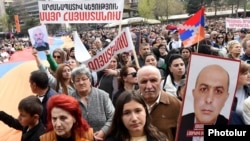Up until this month, the government gave each refugee, who does not own a home or live in a government shelter in Armenia, 50,000 drams ($125) per month for rent and utility fees. The aid program has benefited the vast majority of some 105,000 Karabakh Armenians who fled their homeland after it was recaptured by Azerbaijan in September 2023.
The government decided in November 2024 to phase out the housing scheme. Starting from April 1, the financial aid will be provided only to children, university or college students, pensioners and disabled persons forced to flee Karabakh. The monthly allowance paid to them will be cut to 40,000 drams in April and to 30,000 drams in July.
Thousands of refugees rallied in Yerevan on March 29 to demand that Prime Minister Nikol Pashinian’s cabinet rescind its decision. Organizers of the rally also voiced a dozen other, mostly political demands. They pledged to resume the protests later this month after holding fruitless talks with Khachatrian last week.
Speaking to Armenian Public Television late on Monday, the vice-premier said the government is continuing its “dialogue” with representatives of the refugees in hopes of finding mutually acceptable solutions. But he gave no indications that it will restore the housing aid vital for them.
Pashinian said in November that the aid cut will encourage working-age Karabakh Armenians to “start thinking about supporting their families through their own work.” Khachatrian gave a different rationale, blaming the allowances for a lack of interest in a controversial government plan to help refugees obtain permanent housing in Armenia.
The five-year program launched last summer offers financial assistance to refugees willing to buy or build new homes in mainly rural areas. Each refugee is eligible for between 2 million and 5 million drams ($5,000-$13,000) in government grants that could only be used for meeting their housing needs.
Many refugees complain that the sums offered by the government are not enough to buy or build even modest homes. Only about 900 Karabakh Armenian families have applied for such aid, and just 100 of them have actually acquired new homes with it so far.
A lack of affordable housing remains one of the main problems facing the refugees. According to the Armenian Ministry of Labor and Social Affairs, 26,400 of them currently have jobs or own businesses in Armenia.
Many of those refugees complain that they earn barely enough to rent small apartments in Yerevan or surrounding areas that offer far more job opportunities than other parts of the country. Citing the State Revenue Committee, Civilnet.am reported last week that as of January 56 percent of them had monthly wages not exceeding 120,000 drams ($306).





